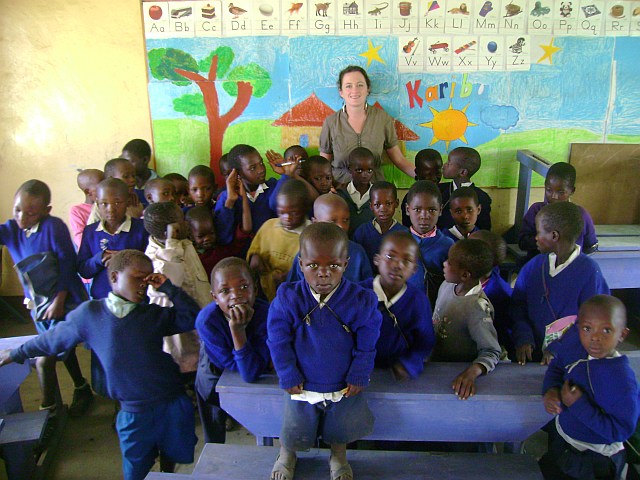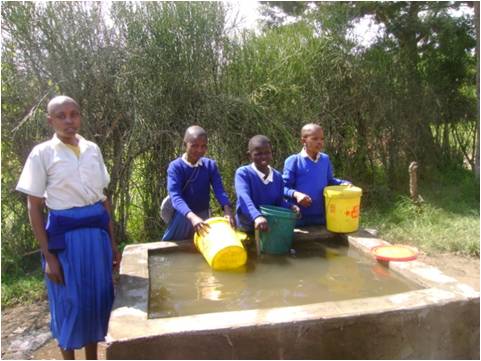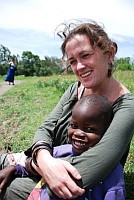I heard a famous quote once that said, “each child is potentially the light of the world, and at the same time its darkness”. What determines whether a child will follow a path towards lightness and potential or a path towards darkness? I believe it is the role of parents and teachers to guide children towards the path of goodness. But what if that child has neither parents nor teachers? Who then will steer them in the right direction?
As a rule, I usually make it a point not to give handouts to street kids. In Canada, I justify that rule with the fact that we have so many social programs in place. Here, I don’t like that people look at Mzungus as walking banks, but then I remind myself that, here, there are no social programs in place. The only option when you’re hungry is to hit the streets and put yourself at the mercy of others. I have maintained this practice of zero handouts throughout my entire time in Tanzania and it has taken me a long time to earn love and respect for what I do and not for what I have. However, I have recently made an exception with Anderson, a local Arusha street kid who is a part of the “clock tower crew”. The clock tower is the central part of town where you are most likely to be bombarded by street touts like Anderson who earn a few shillings by coaxing you into the office of a safari company. Anderson is 17, or so he says. His English is quite good as it has to be. He hustles safaris to tourists and must be able to talk the talk. He has learned his English on the streets.

I’ve slackened my no giving rule, and each time I see him, I feed him and ask him a few more questions about his life, his living situation, his reality. His parents died when he was young…he can’t remember when, and something about an older brother and sister living away and not caring. At the end of the day, the street kids get together and go to sleep…somewhere. He wants to be a doctor. And why, of all the street kids in Arusha, has Anderson so effectively captured my heart? He has never asked me for anything, and each time he greets me with warm wide eyes and a big smile despite his reality of living in poverty with a hungry tummy.
I’ve been thinking about the logistics of getting involved with a kid like Anderson. What if this is a mistake? Can I find a school that will take him? He will need to be taken off the streets and be put in full boarding in order to have any hope of academic success. Can I do that? Endless scenarios of what could go wrong run through my head. But really, what could go wrong for Anderson already has. So, do I choose to be the someone who can help steer him towards his potential as the light of the world? In my mind, it’s not a choice but rather a responsibility. Maybe he’s the next President of Tanzania, maybe he will become that doctor that he so wants to be or maybe he will be taken off the streets for a short time, shown a glimmer of a different life and then return to life on the street. I need to know that at least I tried, and that he was given the opportunity.

Imagine yourself living without electricity, and for those of you familiar with east coast Canadian winters, that is not too much of a stretch. What would you expect the most difficult thing to be? No television perhaps for those of you hooked on your weekly sitcoms? Perhaps it would be not having lights to go about your nightly routine. Or not being able to prepare gourmet meals hassle free on the shiny stove-top would be enough to leave you starving. I bathe each night in a basin by candlelight using approximately 1½ – 2 liters of water. Try it sometime! If I am tired I won’t bother to heat the water but will endure the cold water washing with gritted teeth. When I do take time to heat the water on the kerosene burner, it is so worthwhile. I take my time, first sticking my face in, and saving my dirty feet for last. Sometimes I will make an attempt at washing my hair although usually my efforts are futile. I understand now why everyone here, men and women, boys and girls all have shaved heads. It simply makes more sense.
For me, however, it’s not even the lack of a hot bath in my tub that I find the most challenging. It’s the lack of refrigeration that has taken the most getting used to. Think about it for a minute; how many times you go to the refrigerator in the run of a day? Too numerous to count? Now imagine not having that luxury and how it would change your lifestyle. No preparing food on Monday for the busy week ahead. No stocking up on those sale days at the grocery store and filling the freezer for god knows when. No microwave dinners to take care of that gnawing hunger pang. No ice cream, or dairy for that matter and oh god…no cheese! It certainly takes some adjustments but essentially you end up eating freshly cooked food each day as you are forced to (or else go hungry).
I’m not complaining though as I am lucky enough to have food to prepare. Approximately 820 million people in the world are undernourished, concerned more about where their next meal will come from rather than a cold place to store the excess. Suddenly, a refrigerator doesn’t seem that important after all.

Wiki njema;
Amani na shikamoo
Shannon
Shannon Howlett is a teacher based in Canada, and the article above is taken from a collection of weekly stories that she posted to friends, family, and those who became interested through word of mouth about her year in Tanzania (2008) as a volunteer teacher in a Maasai village.




